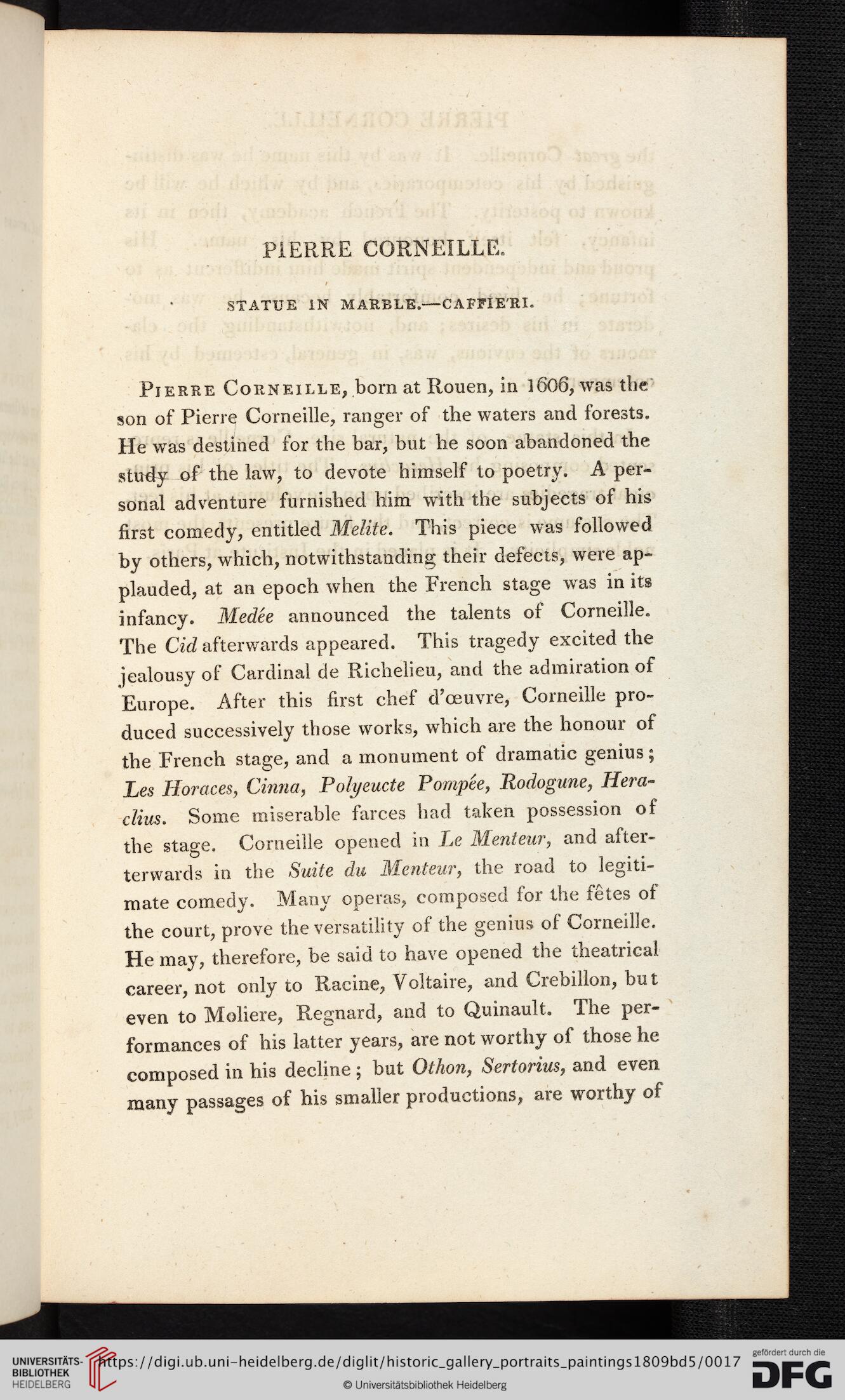PIERRE CORNEILLE.
STATUE IN MARBLE.—CAFFIE'RI.
Pierre Corneille, born at Rouen, in 1606, was the
son of Pierr^ Corneille, ranger of the waters and forests.
He was destined for the bar, but he soon abandoned the
study of the law, to devote himself to poetry. A per-
sonal adventure furnished him with the subjects of his
first comedy, entitled Melite. This piece was followed
by others, which, notwithstanding their defects, were ap-
plauded, at an epoch when the French stage was in its
infancy. Medee announced the talents of Corneille.
The Cid afterwards appeared. This tragedy excited the
jealousy of Cardinal de Richelieu, and the admiration of
Europe. After this first chef d’oeuvre, Corneille pro-
duced successively those works, which are the honour of
the French stage, and a monument of dramatic genius;
Les Horaces, Cinna, Polyeucte Pompee, Rodogune, Hera-
clius. Some miserable farces had taken possession of
the stage. Corneille opened in Le Menteur, and after-
terwards in the Suite du Menteur, the road to legiti-
mate comedy. Many operas, composed for the fetes of
the court, prove the versatility of the genius of Corneille.
He may, therefore, be said to have opened the theatrical
career, not only to Racine, Voltaire, and Crebillon, but
even to Moliere, Regnard, and to Quinault. The per-
formances of his latter years, are not worthy of those he
composed in his decline; but Othon, Sertorius, and even
many passages of his smaller productions, are worthy of
STATUE IN MARBLE.—CAFFIE'RI.
Pierre Corneille, born at Rouen, in 1606, was the
son of Pierr^ Corneille, ranger of the waters and forests.
He was destined for the bar, but he soon abandoned the
study of the law, to devote himself to poetry. A per-
sonal adventure furnished him with the subjects of his
first comedy, entitled Melite. This piece was followed
by others, which, notwithstanding their defects, were ap-
plauded, at an epoch when the French stage was in its
infancy. Medee announced the talents of Corneille.
The Cid afterwards appeared. This tragedy excited the
jealousy of Cardinal de Richelieu, and the admiration of
Europe. After this first chef d’oeuvre, Corneille pro-
duced successively those works, which are the honour of
the French stage, and a monument of dramatic genius;
Les Horaces, Cinna, Polyeucte Pompee, Rodogune, Hera-
clius. Some miserable farces had taken possession of
the stage. Corneille opened in Le Menteur, and after-
terwards in the Suite du Menteur, the road to legiti-
mate comedy. Many operas, composed for the fetes of
the court, prove the versatility of the genius of Corneille.
He may, therefore, be said to have opened the theatrical
career, not only to Racine, Voltaire, and Crebillon, but
even to Moliere, Regnard, and to Quinault. The per-
formances of his latter years, are not worthy of those he
composed in his decline; but Othon, Sertorius, and even
many passages of his smaller productions, are worthy of




